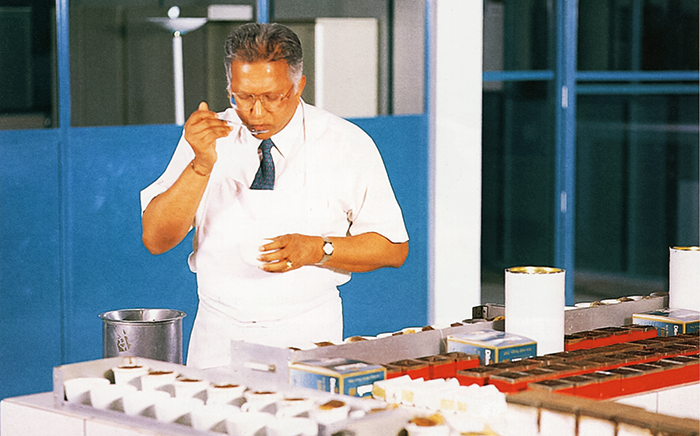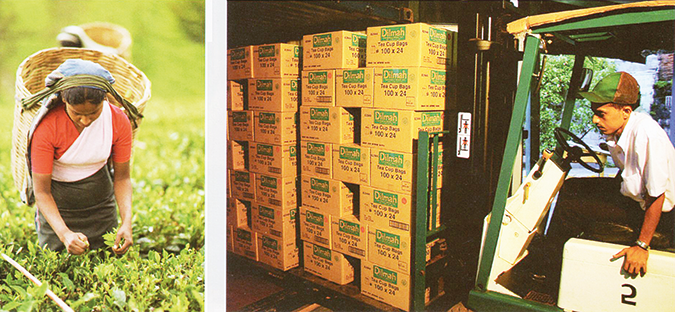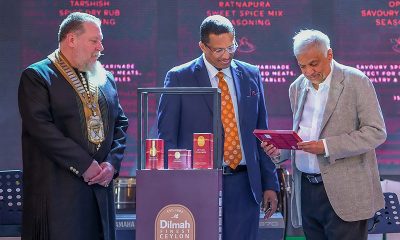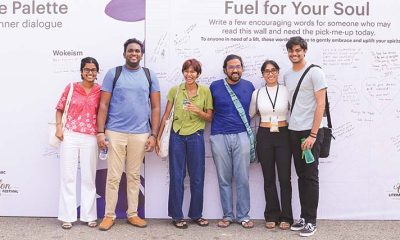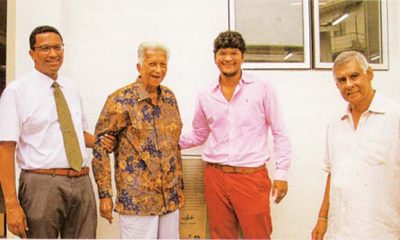Features
Dilmah, my personal ethos and my commitment to marketing a single origin Ceylon tea
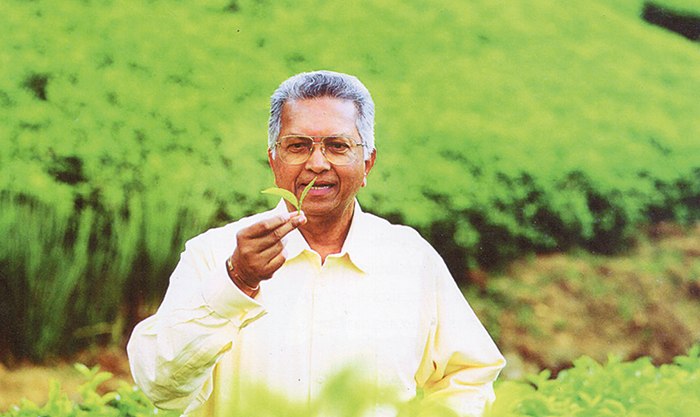
(Excerpted from the Merrill J. Fernando autobiography)
Decades ago, before supermarket chains marketing international brands overwhelmed the consumers’ perception of quality, with marketing hyperbole surrounding mediocre products, it was the neighbourhood grocer running his own shop, who personally wrapped your goods and handed them over the counter. There was meaningful conversation between the two and the transaction implied immediate accountability of the supplier to the consumer.
Today that relationship has been replaced by the faceless and voiceless supermarket retailer, who supports a convenience lifestyle, but leaves no space for direct accountability for product quality.
Most of the currently popular global brands were first launched and developed by small, single entrepreneurs, with a passion for delivering a product with genuine value to the customer. Many of them led small- or medium-sized family companies, such as mine, which competed with each other on product quality, and not by price discounting. These were companies which had been in business for generations and, over time, nurtured their brands with great care and passion.
In time, many such brands, seduced by attractive take-over offers, sold out to massive corporate interests, which marketed the brands on their old, established value propositions, but debased the product in order to lower costs. That is the point at which a product with an intrinsic composite value of individuality and authenticity, becomes a boring, anonymous commodity, to be traded at the mass market label owners’ will.
The small- and medium-scale suppliers who concentrate on quality and the delivery of an authentic product to the consumer, at a commensurate price, were eventually forced out of business, in their inability to accept deep cost reductions whilst still maintaining product integrity. The concentration of the tea industry in the hands of multinationals, Global outreach, changed the priorities of the brands that they acquired from smaller companies.
The passion of the brand founder for authenticity and quality was replaced by the greed for profit, which often meant the debasement of quality. These altered priorities inevitably drove the new brand owners to progressively cheaper sources for tea, in the process sacrificing quality and stifling innovation. Consequently, what is ultimately delivered to the consumer is a commercially viable, low-quality product.
That is exactly what has happened to Ceylon Tea, in many parts of the world where it is still consumed; in the hands of the large multinational retailers, it has become commoditised. The ‘Pure Ceylon Tea’ label was first diminished to ‘Ceylon Blend,’ degraded further to `Ceylon Type,’ and eventually disappeared altogether. However, the customer, anesthetized to reality by the original value perception, and his judgment clouded by marketing make-believe and the hard-sell of attractively-wrapped fiction, continued to patronize the devalued product. Brand loyalty is one-sided. The multinational brand owner has no allegiance to the consumer or the product, but only to profit.
The massive consumption this system generated was followed by fierce competition for shelf space between different brands, leading to progressive lowering of quality by the packer, in order to manage production costs and to remain profitable. The power of multinational traders enabled them to dictate and manipulate the product price, whether it be tea or coffee. The core philosophy of big business is not to be better, but bigger and more profitable. It is an ugly culture in which there is no place for ethics, or the delivery of genuine value. It is an ethos which is certain to generate a race to the bottom, in which the winner is, inevitably, the least scrupulous.
One factor which worked in my favour then, and continues to do so today, was that when I launched Dilmah, it would have been the first time that a brand founder cum brand owner was making personal visits to the countries of consumption to promote his product. With my style of direct, personal marketing, I reintroduced the concept of the producer’s personal accountability to the consumer. I spoke to the consumer and also listened to him. If the product is genuine, the consumer will ensure the success of the brand.
Perhaps fortunately, I had neither studied marketing as a subject, nor ever read a book on marketing. Therefore, I relied on my instinct and the intimate personal knowledge of overseas tea marketing that I had gathered in over four decades up to that time. Those two factors have rarely failed me and they did not fail me in Australia. I knew enough about my product to answer any question on it, unlike a marketing or sales representative, who may not have had comprehensive knowledge of the product or, most importantly, a genuine passion for what he was selling.
Unlike a paid salesman, I was able to tell the potential buyer confidently, that my product was the best and explain why it was so. I talked and lived tea and was not simply selling it. Equally important, there was my unshakable belief that God helps those who strive with diligence and integrity.
As a small, single entrepreneur from a small country, both with limited resources, fighting against multinationals with seemingly-limitless advertising budgets and deep outreach across continents, I gradually came to realize that I had a matchless advantage when it came to product promotion. The multinational was a huge, faceless entity, with no morality and no allegiance to anybody or anything,
except to profit. There was no accountability between the supplier, seller, product, and consumer. It represented a callous, commercial chain with dis-empowered links.
Dilmah, on the other hand, had an intimate brand image, a face, a real man to that face and, behind that man, a real family. The consumer was able to relate his morning cup of tea to a flesh and blood person. It was a unique concept of integrated connectivity, from beginning to end. Dilmah was the only tea brand which provided genuine ‘Garden to Cup’ answerability. In its totality, it spoke of association, authenticity, and accountability, which are perceptions of unquantifiable worth in any relationship, whether it be personal or commercial.
My Dilmah was a dream, dreamt by me as a young man in his early twenties, at the very beginning of his career, serving a colonial master in a field hitherto inaccessible to Ceylonese. It took almost four decades for that dream to reach reality and fruition. That long journey was signposted by hope and despair, success and failure, and active assistance and deliberate sabotage. Finally, my perseverance prevailed, supported by an enduring faith in the inherent goodness of Pure Ceylon Tea, in my ability as a tea-maker, and in my God.
As a consequence of my direct approach and acceptance of personal responsibility for my brand, the buyers became my close friends and took me into their hearts and their homes. I got to know their families and they got to know mine. They understood that my concern for the quality of the product and its acceptance by the consumer genuinely superseded the profit motive.
My Unique Selling Point was that what I presented was garden fresh, unblended, Pure Ceylon Tea and of a genuinely single, and singular, origin. It was packed where it was grown. I was not just a seller or a marketer, or a middleman, selling a product he had no link to, but the head of a close-knit family, which was selling its own creation. I was also a messenger on behalf of a peerless product.
Marketing strategies and styles need to evolve constantly, in order to keep abreast of changing consumer patterns and competition from other products, the latter exerting relentless pressure on the seller of any brand or product. Similarly, with the introduction of electronic mass media and social media platforms delivering instant knowledge globally, my company has also been compelled to frequently adjust its marketing strategies, in order to respond effectively to such daunting challenges.
However, irrespective of the intensity of the contest and the rewards at stake, Dilmah has not, and will not, compromise on its founding principle of quality and purity. As I have said repeatedly in this writing, that core concept is immutable. I cannot say it often enough. Tradition is our bedrock and sustainability, with authenticity our goal. I do not believe in quick fixes to any problem, whether in life or in the marketing of tea.
At the time I launched Dilmah, ‘Ethical Trade’ and ‘Fair Trade’ were not the common currency of the marketing of tea, as they are today. The strength of Dilmah was its commitment to quality and authenticity, which is declared in every pack, supported by the family philosophy behind the brand. In a world of large traders, Dilmah was a farmers’ tea brand, overriding the middleman and going directly to supermarkets the world over.
We did not try to replicate the successful strategies of our larger competitors. We developed our own business concepts, designs, and packaging, whilst our marketing platform clearly reflected our family values and aspirations. Those were our unique selling points, and, in the end, they made the difference.
Dilmah is possibly the one internationally-marketed tea brand which buys its product only from the country where it is grown, and that which is owned, packed, and marketed by the same country, all within one family, with the revenue flowing back to the country of origin. The surplus from that trade also stays in the country of origin. It is that surplus which enables the Dilmah contribution to social justice, environmental conservation, and other worthy causes that benefit the community.
In my mind that is an enterprise model without peer. Well before the ‘Ethical Trade’ and ‘Fair Trade’ labels entered the formal marketing lexicon of the local and international tea trade, as either desirable attributes or mandatory requirements, Dilmah was already voluntarily compliant.
If there is a lesson in Dilmah, it is a very simple one. I followed a dream relentlessly, with passion and integrity, and shared it with my consumers. They listened to me because I was an ordinary man whom they could identify with, telling a story with a simple message that they could understand and believe in. My story never changed because it was a simple truth. I was successful in the delivery of that
message because I had total confidence in myself, a comprehensive knowledge of my product, and complete faith in divine guidance. The timely and happy confluence of those unvarnished verities invested the Dilmah story with the enduring resonance of sustainability and credibility, which are its greatest strengths.
Features
Indian Ocean Security: Strategies for Sri Lanka

During a recent panel discussion titled “Security Environment in the Indo-Pacific and Sri Lankan Diplomacy”, organised by the Embassy of Japan in collaboration with Dr. George I. H. Cooke, Senior Lecturer and initiator of the Awarelogue Initiative, the keynote address was delivered by Prof Ken Jimbo of Kelo University, Japan (Ceylon Today, February 15, 2026).
The report on the above states: “Prof. Jimbo discussed the evolving role of the Indo-Pacific and the emergence of its latest strategic outlook among shifting dynamics. He highlighted how changing geopolitical realities are reshaping the region’s security architecture and influencing diplomatic priorities”.
“He also addressed Sri Lanka’s position within this evolving framework, emphasising that non-alignment today does not mean isolation, but rather, diversified engagement. Such an approach, he noted, requires the careful and strategic management of dependencies to preserve national autonomy while maintaining strategic international partnerships” (Ibid).
Despite the fact that Non-Alignment and Neutrality, which incidentally is Sri Lanka’s current Foreign Policy, are often used interchangeably, both do not mean isolation. Instead, as the report states, it means multi-engagement. Therefore, as Prof. Jimbo states, it is imperative that Sri Lanka manages its relationships strategically if it is to retain its strategic autonomy and preserve its security. In this regard the Policy of Neutrality offers Rule Based obligations for Sri Lanka to observe, and protection from the Community of Nations to respect the territorial integrity of Sri Lanka, unlike Non-Alignment. The Policy of Neutrality served Sri Lanka well, when it declared to stay Neutral on the recent security breakdown between India and Pakistan.
Also participating in the panel discussion was Prof. Terney Pradeep Kumara – Director General of Coast Conservation and Coastal Resources Management, Ministry of Environment and Professor of Oceanography in the University of Ruhuna.
He stated: “In Sri Lanka’s case before speaking of superpower dynamics in the Indo-Pacific, the country must first establish its own identity within the Indian Ocean region given its strategically significant location”.
“He underlined the importance of developing the ‘Sea of Lanka concept’ which extends from the country’s coastline to its 200nauticalmile Exclusive Economic Zone (EEZ). Without firmly establishing this concept, it would be difficult to meaningfully engage with the broader Indian Ocean region”.
“He further stated that the Indian Ocean should be regarded as a zone of peace. From a defence perspective, Sri Lanka must remain neutral. However, from a scientific and resource perspective, the country must remain active given its location and the resources available in its maritime domain” (Ibid).
Perhaps influenced by his academic background, he goes on to state:” In that context Sri Lanka can work with countries in the Indian Ocean region and globally, including India, China, Australia and South Africa. The country must remain open to such cooperation” (Ibid).
Such a recommendation reflects a poor assessment of reality relating to current major power rivalry. This rivalry was addressed by me in an article titled “US – CHINA Rivalry: Maintaining Sri Lanka’s autonomy” ( 12.19. 2025) which stated: “However, there is a strong possibility for the US–China Rivalry to manifest itself engulfing India as well regarding resources in Sri Lanka’s Exclusive Economic Zone. While China has already made attempts to conduct research activities in and around Sri Lanka, objections raised by India have caused Sri Lanka to adopt measures to curtail Chinese activities presumably for the present. The report that the US and India are interested in conducting hydrographic surveys is bound to revive Chinese interests. In the light of such developments it is best that Sri Lanka conveys well in advance that its Policy of Neutrality requires Sri Lanka to prevent Exploration or Exploitation within its Exclusive Economic Zone under the principle of the Inviolability of territory by any country” ( https://island.lk/us- china-rivalry-maintaining-sri-lankas-autonomy/). Unless such measures are adopted, Sri Lanka’s Exclusive Economic Zone would end up becoming the theater for major power rivalry, with negative consequences outweighing possible economic gains.
The most startling feature in the recommendation is the exclusion of the USA from the list of countries with which to cooperate, notwithstanding the Independence Day message by the US Secretary of State which stated: “… our countries have developed a strong and mutually beneficial partnership built on the cornerstone of our people-to-people ties and shared democratic values. In the year ahead, we look forward to increasing trade and investment between our countries and strengthening our security cooperation to advance stability and prosperity throughout the Indo-Pacific region (NEWS, U.S. & Sri Lanka)
Such exclusions would inevitably result in the US imposing drastic tariffs to cripple Sri Lanka’s economy. Furthermore, the inclusion of India and China in the list of countries with whom Sri Lanka is to cooperate, ignores the objections raised by India about the presence of Chinese research vessels in Sri Lankan waters to the point that Sri Lanka was compelled to impose a moratorium on all such vessels.
CONCLUSION
During a panel discussion titled “Security Environment in the Indo-Pacific and Sri Lankan Diplomacy” supported by the Embassy of Japan, Prof. Ken Jimbo of Keio University, Japan emphasized that “… non-alignment today does not mean isolation”. Such an approach, he noted, requires the careful and strategic management of dependencies to preserve national autonomy while maintaining strategic international partnerships”. Perhaps Prof. Jimbo was not aware or made aware that Sri Lanka’s Foreign Policy is Neutral; a fact declared by successive Governments since 2019 and practiced by the current Government in the position taken in respect of the recent hostilities between India and Pakistan.
Although both Non-Alignment and Neutrality are often mistakenly used interchangeably, they both do NOT mean isolation. The difference is that Non-Alignment is NOT a Policy but only a Strategy, similar to Balancing, adopted by decolonized countries in the context of a by-polar world, while Neutrality is an Internationally recognised Rule Based Policy, with obligations to be observed by Neutral States and by the Community of Nations. However, Neutrality in today’s context of geopolitical rivalries resulting from the fluidity of changing dynamics offers greater protection in respect of security because it is Rule Based and strengthened by “the UN adoption of the Indian Ocean as a Zone of peace”, with the freedom to exercise its autonomy and engage with States in pursuit of its National Interests.
Apart from the positive comments “that the Indian Ocean should be regarded as a Zone of Peace” and that “from a defence perspective, Sri Lanka must remain neutral”, the second panelist, Professor of Oceanography at the University of Ruhuna, Terney Pradeep Kumara, also advocated that “from a Scientific and resource perspective (in the Exclusive Economic Zone) the country must remain active, given its location and the resources available in its maritime domain”. He went further and identified that Sri Lanka can work with countries such as India, China, Australia and South Africa.
For Sri Lanka to work together with India and China who already are geopolitical rivals made evident by the fact that India has already objected to the presence of China in the “Sea of Lanka”, questions the practicality of the suggestion. Furthermore, the fact that Prof. Kumara has excluded the US, notwithstanding the US Secretary of State’s expectations cited above, reflects unawareness of the geopolitical landscape in which the US, India and China are all actively known to search for minerals. In such a context, Sri Lanka should accept its limitations in respect of its lack of Diplomatic sophistication to “work with” such superpower rivals who are known to adopt unprecedented measures such as tariffs, if Sri Lanka is to avoid the fate of Milos during the Peloponnesian Wars.
Under the circumstances, it is in Sri Lanka’s best interest to lay aside its economic gains for security, and live by its proclaimed principles and policies of Neutrality and the concept of the Indian Ocean as a Zone of Peace by not permitting its EEC to be Explored and/or Exploited by anyone in its “maritime domain”. Since Sri Lanka is already blessed with minerals on land that is awaiting exploitation, participating in the extraction of minerals at the expense of security is not only imprudent but also an environmental contribution given the fact that the Sea and its resources is the Planet’s Last Frontier.
by Neville Ladduwahetty
Features
Protecting the ocean before it’s too late: What Sri Lankans think about deep seabed mining

Far beneath the waters surrounding Sri Lanka lies a largely unseen frontier, a deep seabed that may contain cobalt, nickel and rare earth elements essential to modern technologies, from smartphones to electric vehicles. Around the world, governments and corporations are accelerating efforts to tap these minerals, presenting deep-sea mining as the next chapter of the global “blue economy.”
For an island nation whose ocean territory far exceeds its landmass, the question is no longer abstract. Sri Lanka has already demonstrated its commitment to ocean governance by ratifying the United Nations High Seas Treaty (BBNJ Agreement) in September 2025, becoming one of the early countries to help trigger its entry into force. The treaty strengthens biodiversity conservation beyond national jurisdiction and promotes fair access to marine genetic resources.
Yet as interest grows in seabed minerals, a critical debate is emerging: Can Sri Lanka pursue deep-sea mining ambitions without compromising marine ecosystems, fisheries and long-term sustainability?
Speaking to The Island, Prof. Lahiru Udayanga, Dr. Menuka Udugama and Ms. Nethini Ganepola of the Department of Agribusiness Management, Faculty of Agriculture & Plantation Management, together with Sudarsha De Silva, Co-founder of EarthLanka Youth Network and Sri Lanka Hub Leader for the Sustainable Ocean Alliance, shared findings from their newly published research examining how Sri Lankans perceive deep-sea mineral extraction.
The study, published in the journal Sustainability and presented at the International Symposium on Disaster Resilience and Sustainable Development in Thailand, offers rare empirical insight into public attitudes toward deep-sea mining in Sri Lanka.
Limited Public Inclusion
“Our study shows that public inclusion in decision-making around deep-sea mining remains quite limited,” Ms. Nethini Ganepola told The Island. “Nearly three-quarters of respondents said the issue is rarely covered in the media or discussed in public forums. Many feel that decisions about marine resources are made mainly at higher political or institutional levels without adequate consultation.”
The nationwide survey, conducted across ten districts, used structured questionnaires combined with a Discrete Choice Experiment — a method widely applied in environmental economics to measure how people value trade-offs between development and conservation.
Ganepola noted that awareness of seabed mining remains low. However, once respondents were informed about potential impacts — including habitat destruction, sediment plumes, declining fish stocks and biodiversity loss — concern rose sharply.
“This suggests the problem is not a lack of public interest,” she told The Island. “It is a lack of accessible information and meaningful opportunities for participation.”
Ecology Before Extraction
Dr. Menuka Udugama said the research was inspired by Sri Lanka’s growing attention to seabed resources within the wider blue economy discourse — and by concern that extraction could carry long-lasting ecological and livelihood risks if safeguards are weak.
“Deep-sea mining is often presented as an economic opportunity because of global demand for critical minerals,” Dr. Udugama told The Island. “But scientific evidence on cumulative impacts and ecosystem recovery remains limited, especially for deep habitats that regenerate very slowly. For an island nation, this uncertainty matters.”
She stressed that marine ecosystems underpin fisheries, tourism and coastal well-being, meaning decisions taken about the seabed can have far-reaching consequences beyond the mining site itself.
Prof. Lahiru Udayanga echoed this concern.
“People tended to view deep-sea mining primarily through an environmental-risk lens rather than as a neutral industrial activity,” Prof. Udayanga told The Island. “Biodiversity loss was the most frequently identified concern, followed by physical damage to the seabed and long-term resource depletion.”
About two-thirds of respondents identified biodiversity loss as their greatest fear — a striking finding for an issue that many had only recently learned about.
A Measurable Value for Conservation
Perhaps the most significant finding was the public’s willingness to pay for protection.
“On average, households indicated a willingness to pay around LKR 3,532 per year to protect seabed ecosystems,” Prof. Udayanga told The Island. “From an economic perspective, that represents the social value people attach to marine conservation.”
The study’s advanced statistical analysis — using Conditional Logit and Random Parameter Logit models — confirmed strong and consistent support for policy options that reduce mineral extraction, limit environmental damage and strengthen monitoring and regulation.
The research also revealed demographic variations. Younger and more educated respondents expressed stronger pro-conservation preferences, while higher-income households were willing to contribute more financially.
At the same time, many respondents expressed concern that government agencies and the media have not done enough to raise awareness or enforce safeguards — indicating a trust gap that policymakers must address.
“Regulations and monitoring systems require social acceptance to be workable over time,” Dr. Udugama told The Island. “Understanding public perception strengthens accountability and clarifies the conditions under which deep-sea mining proposals would be evaluated.”
Youth and Community Engagement
Ganepola emphasised that engagement must begin with transparency and early consultation.
“Decisions about deep-sea mining should not remain limited to technical experts,” she told The Island. “Coastal communities — especially fishers — must be consulted from the beginning, as they are directly affected. Youth engagement is equally important because young people will inherit the long-term consequences of today’s decisions.”
She called for stronger media communication, public hearings, stakeholder workshops and greater integration of marine conservation into school and university curricula.
“Inclusive and transparent engagement will build trust and reduce conflict,” she said.
A Regional Milestone
Sudarsha De Silva described the study as a milestone for Sri Lanka and the wider Asian region.
“When you consider research publications on this topic in Asia, they are extremely limited,” De Silva told The Island. “This is one of the first comprehensive studies in Sri Lanka examining public perception of deep-sea mining. Organizations like the Sustainable Ocean Alliance stepping forward to collaborate with Sri Lankan academics is a great achievement.”
He also acknowledged the contribution of youth research assistants from EarthLanka — Malsha Keshani, Fathima Shamla and Sachini Wijebandara — for their support in executing the study.
A Defining Choice
As Sri Lanka charts its blue economy future, the message from citizens appears unmistakable.
Development is not rejected. But it must not come at the cost of irreversible ecological damage.
The ocean’s true wealth, respondents suggest, lies not merely in minerals beneath the seabed, but in the living systems above it — systems that sustain fisheries, tourism and coastal communities.
For policymakers weighing the promise of mineral wealth against ecological risk, the findings shared with The Island offer a clear signal: sustainable governance and biodiversity protection align more closely with public expectations than unchecked extraction.
In the end, protecting the ocean may prove to be not only an environmental responsibility — but the most prudent long-term investment Sri Lanka can make.
By Ifham Nizam
Features
How Black Civil Rights leaders strengthen democracy in the US
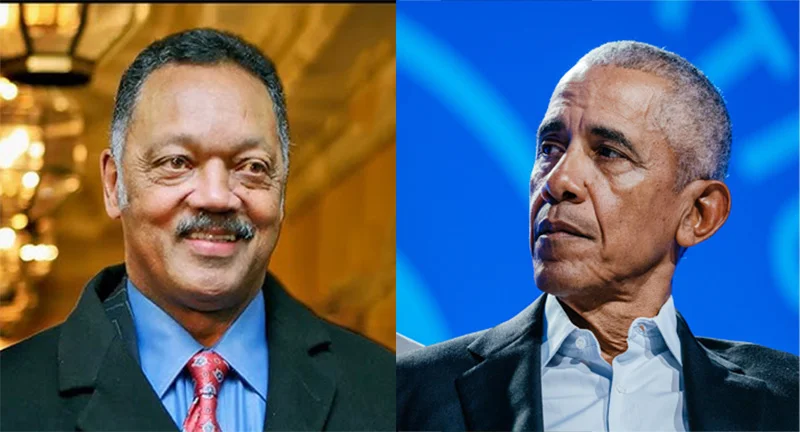
 On being elected US President in 2008, Barack Obama famously stated: ‘Change has come to America’. Considering the questions continuing to grow out of the status of minority rights in particular in the US, this declaration by the former US President could come to be seen as somewhat premature by some. However, there could be no doubt that the election of Barack Obama to the US presidency proved that democracy in the US is to a considerable degree inclusive and accommodating.
On being elected US President in 2008, Barack Obama famously stated: ‘Change has come to America’. Considering the questions continuing to grow out of the status of minority rights in particular in the US, this declaration by the former US President could come to be seen as somewhat premature by some. However, there could be no doubt that the election of Barack Obama to the US presidency proved that democracy in the US is to a considerable degree inclusive and accommodating.
If this were not so, Barack Obama, an Afro-American politician, would never have been elected President of the US. Obama was exceptionally capable, charismatic and eloquent but these qualities alone could not have paved the way for his victory. On careful reflection it could be said that the solid groundwork laid by indefatigable Black Civil Rights activists in the US of the likes of Martin Luther King (Jnr) and Jesse Jackson, who passed away just recently, went a great distance to enable Obama to come to power and that too for two terms. Obama is on record as owning to the profound influence these Civil Rights leaders had on his career.
The fact is that these Civil Rights activists and Obama himself spoke to the hearts and minds of most Americans and convinced them of the need for democratic inclusion in the US. They, in other words, made a convincing case for Black rights. Above all, their struggles were largely peaceful.
Their reasoning resonated well with the thinking sections of the US who saw them as subscribers to the Universal Declaration of Human Rights, for instance, which made a lucid case for mankind’s equal dignity. That is, ‘all human beings are equal in dignity.’
It may be recalled that Martin Luther King (Jnr.) famously declared: ‘I have a dream that one day this nation will rise up, live out the true meaning of its creed….We hold these truths to be self-evident, that all men are created equal.’
Jesse Jackson vied unsuccessfully to be a Democratic Party presidential candidate twice but his energetic campaigns helped to raise public awareness about the injustices and material hardships suffered by the black community in particular. Obama, we now know, worked hard at grass roots level in the run-up to his election. This experience proved invaluable in his efforts to sensitize the public to the harsh realities of the depressed sections of US society.
Cynics are bound to retort on reading the foregoing that all the good work done by the political personalities in question has come to nought in the US; currently administered by Republican hard line President Donald Trump. Needless to say, minority communities are now no longer welcome in the US and migrants are coming to be seen as virtual outcasts who need to be ‘shown the door’ . All this seems to be happening in so short a while since the Democrats were voted out of office at the last presidential election.
However, the last US presidential election was not free of controversy and the lesson is far too easily forgotten that democratic development is a process that needs to be persisted with. In a vital sense it is ‘a journey’ that encounters huge ups and downs. More so why it must be judiciously steered and in the absence of such foresighted managing the democratic process could very well run aground and this misfortune is overtaking the US to a notable extent.
The onus is on the Democratic Party and other sections supportive of democracy to halt the US’ steady slide into authoritarianism and white supremacist rule. They would need to demonstrate the foresight, dexterity and resourcefulness of the Black leaders in focus. In the absence of such dynamic political activism, the steady decline of the US as a major democracy cannot be prevented.
From the foregoing some important foreign policy issues crop-up for the global South in particular. The US’ prowess as the ‘world’s mightiest democracy’ could be called in question at present but none could doubt the flexibility of its governance system. The system’s inclusivity and accommodative nature remains and the possibility could not be ruled out of the system throwing up another leader of the stature of Barack Obama who could to a great extent rally the US public behind him in the direction of democratic development. In the event of the latter happening, the US could come to experience a democratic rejuvenation.
The latter possibilities need to be borne in mind by politicians of the South in particular. The latter have come to inherit a legacy of Non-alignment and this will stand them in good stead; particularly if their countries are bankrupt and helpless, as is Sri Lanka’s lot currently. They cannot afford to take sides rigorously in the foreign relations sphere but Non-alignment should not come to mean for them an unreserved alliance with the major powers of the South, such as China. Nor could they come under the dictates of Russia. For, both these major powers that have been deferentially treated by the South over the decades are essentially authoritarian in nature and a blind tie-up with them would not be in the best interests of the South, going forward.
However, while the South should not ruffle its ties with the big powers of the South it would need to ensure that its ties with the democracies of the West in particular remain intact in a flourishing condition. This is what Non-alignment, correctly understood, advises.
Accordingly, considering the US’ democratic resilience and its intrinsic strengths, the South would do well to be on cordial terms with the US as well. A Black presidency in the US has after all proved that the US is not predestined, so to speak, to be a country for only the jingoistic whites. It could genuinely be an all-inclusive, accommodative democracy and by virtue of these characteristics could be an inspiration for the South.
However, political leaders of the South would need to consider their development options very judiciously. The ‘neo-liberal’ ideology of the West need not necessarily be adopted but central planning and equity could be brought to the forefront of their talks with Western financial institutions. Dexterity in diplomacy would prove vital.
-

 Life style7 days ago
Life style7 days agoMarriot new GM Suranga
-

 Business6 days ago
Business6 days agoMinistry of Brands to launch Sri Lanka’s first off-price retail destination
-

 Features7 days ago
Features7 days agoMonks’ march, in America and Sri Lanka
-

 Features7 days ago
Features7 days agoThe Rise of Takaichi
-

 Features7 days ago
Features7 days agoWetlands of Sri Lanka:
-

 News7 days ago
News7 days agoThailand to recruit 10,000 Lankans under new labour pact
-

 Latest News1 day ago
Latest News1 day agoNew Zealand meet familiar opponents Pakistan at spin-friendly Premadasa
-

 Latest News1 day ago
Latest News1 day agoTariffs ruling is major blow to Trump’s second-term agenda

